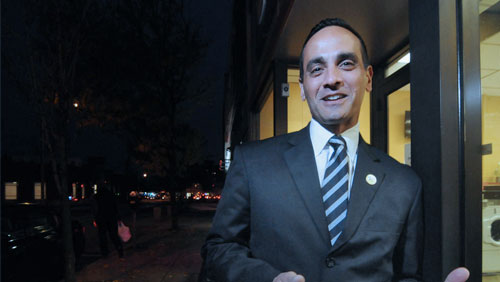The gloves are off as Somerville Mayor Joseph Curtatone lay his chips on the table during the appeal hearing on the issuance of an 85-year environmental permit to Wynn Resorts’ Wynn Boston Harbor casino.
 But the much awaited face-off between Curtatone and Wynn Boston Harbor President Robert DeSalvio did not happen after the Somerville mayor failed to show up in Thursday’s hearing, online news website WickedLocal reported.
But the much awaited face-off between Curtatone and Wynn Boston Harbor President Robert DeSalvio did not happen after the Somerville mayor failed to show up in Thursday’s hearing, online news website WickedLocal reported.
Taking up the cudgels for the Curtatone, city attorneys and consulting lawyers argued before a state environmental official that Wynn’s Chapter 91 environmental permit for the casino project was issued improperly, without proper environmental reviews. The lawyers also contend that the length of the permit — 85 years — is too long.
One of the city lawyers even described the state’s issuance of an 85-year environmental license to the $2 billion waterfront casino as “fatally flawed.”
“Somerville has also proved that the process of the issuance of the extended term license was fatally flawed. The decision to grant an 85-year license was made entirely out of the public view,” Donald Pinto, one of the city consulting lawyer, said.
He claimed that Wynn submitted their justification for an extended license term only after the state’s Department of Environmental Protection (DEP) closed the public hearing process for the license. The move, he said, casted doubt on the process since it looks as if it was done out of the public eye.
Pinto also argued that the project failed to satisfy the requirements for the issuance of an extended 85-year license.
To bolster their claim that the state is in the disadvantage when it approved Wynn’s environmental permit, the camp of Curtatone presented former DEP commissioner Robert Golledge during the hearing.
Golledge testified that the permit granted to the Everett project was a “clear outlier” and that the state regulators should have demanded more from Wynn Resorts, according to the Boston Globe.
“Given the size, mass, and location of the Wynn project, I would have expected a much larger and more robust mitigation package,” Golledge said. “I think this mitigation package is essentially average.”
The ex-DEP commissioner also noted that the state failed to require water taxi service to the casino.
“Water transportation has been a priority for years,” he said.
But Ben Lynch, a DEP official who first reviewed Wynn’s application, countered the arguments raised by both Pinto and Golledge, insisting that Wynn Resorts had faithfully complied with the requirements of the law.
On the other hand, Wynn Resorts lawyer Tony Starr assured everyone that will benefit from the casino project since they plan to put-up a two-acre park, which he said is larger than required under waterfront regulations.
DeSalvio, who was grilled by Somerville attorneys about his inexperience in dealing with casinos that utilize water transportation networks, said that he will wait for the appeal to be resolved before he give his comments on the proceedings.
Meanwhile, DEP spokesman Edmund Coletta said that they will be giving both parties until June 21 to provide their closing briefs. Presiding Officer Jane Rothchild is expected to make a decision on the appeal in mid-July and MassDEP Commissioner Martin Suuberg will make a final ruling about two to three weeks after, according to DEP Spokesman Edmund Coletta.